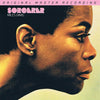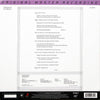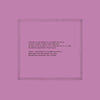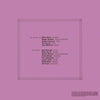







Miles Davis - Sorcerer (2LP, Ultra Analog, Half-speed Mastering, 45 tours)
ORDER LIMITED TO ONE ITEM PER CUSTOMER
Miles Davis – trumpet [click here to see more vinyl featuring Miles Davis]
Wayne Shorter – tenor saxophone [click here to see more vinyl featuring Wayne Shorter]
Herbie Hancock – piano (all tracks except D2) [click here to see more vinyl featuring Herbie Hancock]
Ron Carter – double bass (all tracks except D2) [click here to see more vinyl featuring Ron Carter]
Tony Williams – drums (all tracks except D2)
Bob Dorough – vocals (D2)
Gil Evans – arrangements (D2) [click here to see more vinyl featuring Gil Evans]
Frank Rehak – trombone (D2)
Jimmy Cobb – drums (D2) [click here to see other vinyl featuring Jimmy Cobb]
Willie Bobo (William Correa) – bongos (D2)
2 LPs, gatefold sleeve
Limited numbered edition
Original analog Master tape : YES
Half-speed Mastering
Gain 2™ Ultra Analog
Heavy Press : 180g
Record color : black
Speed : 45RPM
Size : 12”
Stereo
Studio
Record Press : Fidelity Record Pressing
Label : MOFI
Original Label : Columbia
Recorded May 16–24, 1967 and August 21, 1962 (D2) at Columbia Studio, 30th Street, New York City
Engineered by : Fred Plaut, Ray Moore
Produced by Teo Macero
Remastered by Krieg Wunderlich
Originally released in 1967
Reissued in 2014
Tracks:
Side A :
- Prince of Darkness
- Pee Wee
Side B :
- Masqualero
- The Sorcerer
Side C :
- Limbo
Side D :
- Vonetta
- Nothing Like You
Reviews :
"If the iconic Miles Davis album Kind of Blue captured an event-an abrupt musical switch from melody to modal, these three mid-period quintet albums, Sorcerer (1967), Nefertiti (1968) and Filles De Kilimanjaro (1969) represent a period of transition as the quintet moves slowly towards Miles's amplified instrument embrace. ... These three double 45rpm releases along with much of the Miles catalog are among Mobile Fidelity's best work to date. For Miles fans these are not to be missed." Michael Fremer, Analogplanet.com
"Sorcerer, the third album by the second Miles Davis Quintet, is in a sense a transitional album, a quiet, subdued affair that rarely blows hot, choosing to explore cerebral tonal colorings. Even when the tempo picks up, as it does on the title track, there's little of the dense, manic energy on Miles Smiles -- this is about subtle shadings, even when the compositions are as memorable as Tony Williams' "Pee Wee" or Herbie Hancock's "Sorcerer." As such, it's a little elusive, since it represents the deepening of the band's music as they choose to explore different territory. The emphasis is as much on complex, interweaving chords and a coolly relaxed sound as it is on sheer improvisation, though each member tears off thoroughly compelling solos. Still, the individual flights aren't placed at the forefront the way they were on the two predecessors -- it all merges together, pointing toward the dense soundscapes of Miles' later '60s work. It's such a layered, intriguing work that the final cut, recorded in 1962 with Bob Dorough on vocals, is an utterly jarring, inappropriate way to end the record, even if it's intended as a tribute to Miles' then-girlfriend (later, his wife), Cicely Tyson (whose image graces the cover)." AllMusic Review by Stephen Thomas Erlewine
Ultra Analog™ : The GAIN 2 Ultra Analog™ Series stems from the use of the Gain 2 system, mastered at half speed from the original master tapes where possible, capturing and uncovering as before undiscovered sonic information.
Half-speed mastering. In half-speed mastering, the whole process is slowed down to half of the original speed. A typical 33 1/3 rpm record is cut at 16 2/3 rpm. The source material is also slowed down (reducing the pitch in the process) meaning the final record will still sound normal when played back. Slowing the whole process down allows more time, which means the end result sounds better and is more efficient — allowing engineering to minimize the effects of inherent limitations within the vinyl format. The result is a more accurate and more open high-frequency response in the half speed vinyl when compared with a normal speed recording.
Ratings :
AllMusic : 4,5 / 5 , Discogs : 4,44 / 5 , Michael Fremer: — Music = 10/11; Sound = 9/11





